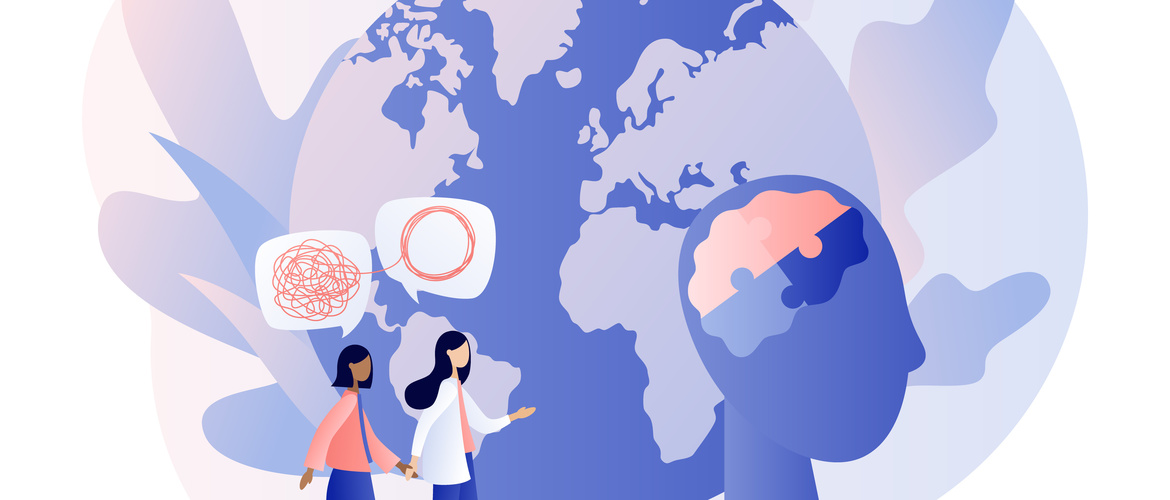
Actions to improve global mental health include development and use of a common language to describe mental health disorders and interventions, inclusive and collective decision-making, training, and education, protection of human rights, and education to eliminate stigma, explained experts at an inspirational plenary session at WCP 2021.
"Actions are needed to provide equitable mental health worldwide", said Professor Norman Sartorius, President of the Association for the Improvement of Mental Health Programs, Geneva, Switzerland. They include:
- "Development and use of a common language to describe mental health disorders and interventions relevant to their solution with removal of historic language and philosophies based on cultural naivety
- Acceptance of differences in priorities and nature of programs to reflect and leverage differing sociocultural and economic circumstances
- Global sharing of information and knowledge crossing language barriers by providing translations in all languages
- Global protection of human rights
- Persuading funders and policy makers to provide adequate resources"
A common language for mental health disorders and interventions is key
"In addition", Professor Sartorius said, "it is essential to involve:
- People with lived experience and caregivers and other stakeholders in the planning, implementation and evaluation of services
- Policy makers to initiate primary preventive actions such as perinatal care
- All mental healthcare workers in training (and leadership) programs with anti-stigma messaging embedded at all stages
- Everyone from age 2 upwards in educational campaigns to address stigma to eliminate embedded prejudices"
Aim for inclusive and collective decision-making, training and education
Equity not equality
"The mental health burden should refer to scope not location", said Professor Oye Gureje, University of Ibadan, Nigeria.
A high burden of mental illness and inequity in healthcare provision are global challenges.1 However, 75% of the burden due to mental, neurologic and substance use disorders and great majority of suicides is experienced by low- and middle-income countries (LMIC).2
People with mental illness need more than people without mental illness
"Equity of healthcare not equality is the goal", said Professor Sartorius, "because people with mental illness need more than people without mental illness at every step of service."
A global vision to improve services
"Global multi-perspective collaborative research and practice on topics such as improving quality of services are needed", said Professor Judith Bass, Johns Hopkins School of Public Health, Baltimore, MD.
In addition, all stakeholders, including patients, caregivers, and healthcare providers need to be involved in the conceptualization and design of services to ensure programs are sustainable.
Education is essential from early childhood to eliminate stigma
Professor Pratima Murthy, Bangalore, India, also commented on the need to tailor common plans to needs and circumstances, saying “Different strokes for different folks.”
"Networking technology provides opportunities for global intervention strategies using examples from different cultures", added Professor Bass," and can be used to:
- Link stakeholders
- Develop learning hubs for global use
- Evaluate primary and secondary prevention"
Addressing human rights
Human rights are denied worldwide due to inability to pay for, or access, mental healthcare
"Mental health is a subject of human rights",3 said Professor Guadalupe Morales Cano, Madrid, Spain, "but human rights are denied worldwide due to inability to pay for, or access, mental healthcare. As a result, many people with mental disorders are restrained by chains, particularly in LMIC."
"Targeting human rights has led to significant change in mental health services in India", said Professor Pratima Murthy, Bangalore, India, "who highlighted community-targeted interventions as the way forward in India."
She concluded her optimistic view for the future with a Sanskrit shloka translated as “May everyone in the world be happy. Happiness comes out of health both mental and physical health.”
WCP : World Congress of Psychiatry
LMIC : low- and middle-income countries
BE-NOTPR-0097, approval date : 10/2021
